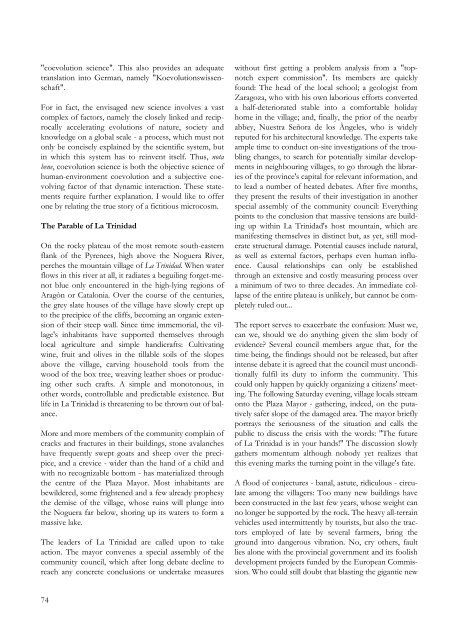PIK Biennial Report 2000-2001 - Potsdam Institute for Climate ...
PIK Biennial Report 2000-2001 - Potsdam Institute for Climate ...
PIK Biennial Report 2000-2001 - Potsdam Institute for Climate ...
Create successful ePaper yourself
Turn your PDF publications into a flip-book with our unique Google optimized e-Paper software.
"coevolution science". This also provides an adequate<br />
translation into German, namely "Koevolutionswissenschaft".<br />
For in fact, the envisaged new science involves a vast<br />
complex of factors, namely the closely linked and reciprocally<br />
accelerating evolutions of nature, society and<br />
knowledge on a global scale - a process, which must not<br />
only be concisely explained by the scientific system, but<br />
in which this system has to reinvent itself. Thus, nota<br />
bene, coevolution science is both the objective science of<br />
human-environment coevolution and a subjective coevolving<br />
factor of that dynamic interaction. These statements<br />
require further explanation. I would like to offer<br />
one by relating the true story of a fictitious microcosm.<br />
The Parable of La Trinidad<br />
On the rocky plateau of the most remote south-eastern<br />
flank of the Pyrenees, high above the Noguera River,<br />
perches the mountain village of La Trinidad. When water<br />
flows in this river at all, it radiates a beguiling <strong>for</strong>get-menot<br />
blue only encountered in the high-lying regions of<br />
Aragòn or Catalonia. Over the course of the centuries,<br />
the grey slate houses of the village have slowly crept up<br />
to the precipice of the cliffs, becoming an organic extension<br />
of their steep wall. Since time immemorial, the village's<br />
inhabitants have supported themselves through<br />
local agriculture and simple handicrafts: Cultivating<br />
wine, fruit and olives in the tillable soils of the slopes<br />
above the village, carving household tools from the<br />
wood of the box tree, weaving leather shoes or producing<br />
other such crafts. A simple and monotonous, in<br />
other words, controllable and predictable existence. But<br />
life in La Trinidad is threatening to be thrown out of balance.<br />
More and more members of the community complain of<br />
cracks and fractures in their buildings, stone avalanches<br />
have frequently swept goats and sheep over the precipice,<br />
and a crevice - wider than the hand of a child and<br />
with no recognizable bottom - has materialized through<br />
the centre of the Plaza Mayor. Most inhabitants are<br />
bewildered, some frightened and a few already prophesy<br />
the demise of the village, whose ruins will plunge into<br />
the Noguera far below, shoring up its waters to <strong>for</strong>m a<br />
massive lake.<br />
The leaders of La Trinidad are called upon to take<br />
action. The mayor convenes a special assembly of the<br />
community council, which after long debate decline to<br />
reach any concrete conclusions or undertake measures<br />
74<br />
without first getting a problem analysis from a "topnotch<br />
expert commission". Its members are quickly<br />
found: The head of the local school; a geologist from<br />
Zaragoza, who with his own laborious ef<strong>for</strong>ts converted<br />
a half-deteriorated stable into a com<strong>for</strong>table holiday<br />
home in the village; and, finally, the prior of the nearby<br />
abbey, Nuestra Señora de los Àngeles, who is widely<br />
reputed <strong>for</strong> his architectural knowledge. The experts take<br />
ample time to conduct on-site investigations of the troubling<br />
changes, to search <strong>for</strong> potentially similar developments<br />
in neighbouring villages, to go through the libraries<br />
of the province's capital <strong>for</strong> relevant in<strong>for</strong>mation, and<br />
to lead a number of heated debates. After five months,<br />
they present the results of their investigation in another<br />
special assembly of the community council: Everything<br />
points to the conclusion that massive tensions are building<br />
up within La Trinidad's host mountain, which are<br />
manifesting themselves in distinct but, as yet, still moderate<br />
structural damage. Potential causes include natural,<br />
as well as external factors, perhaps even human influence.<br />
Causal relationships can only be established<br />
through an extensive and costly measuring process over<br />
a minimum of two to three decades. An immediate collapse<br />
of the entire plateau is unlikely, but cannot be completely<br />
ruled out...<br />
The report serves to exacerbate the confusion: Must we,<br />
can we, should we do anything given the slim body of<br />
evidence? Several council members argue that, <strong>for</strong> the<br />
time being, the findings should not be released, but after<br />
intense debate it is agreed that the council must unconditionally<br />
fulfil its duty to in<strong>for</strong>m the community. This<br />
could only happen by quickly organizing a citizens' meeting.<br />
The following Saturday evening, village locals stream<br />
onto the Plaza Mayor - gathering, indeed, on the putatively<br />
safer slope of the damaged area. The mayor briefly<br />
portrays the seriousness of the situation and calls the<br />
public to discuss the crisis with the words: "The future<br />
of La Trinidad is in your hands!" The discussion slowly<br />
gathers momentum although nobody yet realizes that<br />
this evening marks the turning point in the village's fate.<br />
A flood of conjectures - banal, astute, ridiculous - circulate<br />
among the villagers: Too many new buildings have<br />
been constructed in the last few years, whose weight can<br />
no longer be supported by the rock. The heavy all-terrain<br />
vehicles used intermittently by tourists, but also the tractors<br />
employed of late by several farmers, bring the<br />
ground into dangerous vibration. No, cry others, fault<br />
lies alone with the provincial government and its foolish<br />
development projects funded by the European Commission.<br />
Who could still doubt that blasting the gigantic new

















